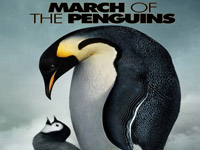March of the Penguins (Luc Jacquet, 2005)

This morning we began our day on the porch, bundled against a cool breeze blowing off the lake. We sipped hot coffee and watched the birds. The generosity of good friends allows us to spend a week in this cabin, remote in the woods of northern Wisconsin. Six loons slowly made their way across the lake, finally scooting across the water as they took off, their wings beating the surface until they lifted clear, their haunting calls echoing between the wooded shores. A bald eagle swooped down from a perch high in a majestic pine tree, dipped its talons into the water and retreated back to the tree to eat the fish it had snatched. Chickadees visit the feeder we have stocked, laboriously opening each black sunflower seed with their tiny beaks. Their calls are the first we hear as we awaken. A pair of pileated woodpeckers visited a downed tree, bigger than I imagined they’d be, and hammered at the dead wood. Two families of Canadian geese swim by the dock, honking, heads held high as if observing us with bemused condescension.
The birds did not interrupt our morning prayers, but deepened them. When the Hebrew prophet wants to astonish our imaginations at the outrage of war, he paints a word picture of horrible emptiness. “I looked,” Jeremiah writes, “every bird in the sky had flown away” (4:25). The heavens reveal God’s glory, the psalmist says (19:1), and anyone who has watched birds cavort effortlessly and sing exuberantly has little trouble believing it is so. Even those who do not believe in a transcendent Beauty can be moved to awe, touched by a glory that birds display.
Two recent documentary films celebrate birds, permitting us glimpses into their lives that would be impossible except for the creativity and dogged hard work of the film makers. In Winged Migration we actually fly with flocks as they make their way across continents in their annual migration. And in March of the Penguins we plod along with lines of emperor penguins across 70 miles of Antarctic ice to the isolated spot where they brave the howling blizzards of winter to incubate a single egg.
To make Winged Migration, the film makers raised some of the migrating birds in order to acquaint them with the small engine-powered gliders the cinematographers would use to accompany the flocks in the air. Being—through the eye of the camera—in a V of geese crossing mountain peaks to land in a lake is an exhilarating experience. This is one of the glories of film as art—allowing us unique moments that we could never experience on our own.
To make March of the Penguins the film makers dragged sleds of equipment across sea ice strewn with breaks and crevasses to film in temperatures of 50 below zero in blizzards with gale force winds. Watching the penguins huddled together for warmth to stay alive makes the crew’s determination all the more admirable. And since the penguins’ trek is in the dead of winter, the sun never rises, so the film makers had to haul spot lights to flood the area with enough light to film.
One Christian critic, in an otherwise positive review of March of the Penguins, bemoaned the fact that not once did the film acknowledge the Creator. I found his comment jarring. The film had moved me deeply, a reminder that Creation speaks God’s word as truly as does Scripture, and provides a point of contact between me and those who do not hold my world and life view. I do not expect the people of Babylonia to share the beliefs of Zion, and wonder if complaining about that fact is helpful. Complaining sounds like whining, and convinces no one. March of the Penguins moved me to worship, in wonder at the creativity expressed in nature that exceeds my imagination. Roger Ebert, commenting on the barren, harsh landscape of the Antarctic noted its “ethereal beauty.” He is correct; it is breathtaking.
Both films capture something of the film maker’s sense of awe. In Winged Migration the beating of the wings sets the rhythm of the musical score. The music is mystical, providing an ambiguous spirituality that each viewer is free to interpret on their own. The lyrics hint at our oneness with the birds we are watching, and the score evokes a haunting transcendence. The narration in March of the Penguins both describes the action, and subtly interprets it. The penguins make their annual trek for “love,” we are told. Christy Lemire, writing in the San Francisco Examiner (June 30, 2005) objects. “[C]haracterizing what these penguins do as an act of love, as the film does, is a reach. How do we know it’s love? They’re penguins! They have to make more penguins. This is what they instinctively know to do. Assigning human emotion to the process comes off as a feeble attempt at the warm fuzzies.” I disagree—it is more than “warm fuzzies.” What they were filming could not be adequately captured in a narration limited to the dry, academic, reductionist language of science about raw instinct.
Both documentaries are splendidly filmed and worth watching. And just think: someday, when the King returns, this sad planet will be cleansed and redeemed from the curse. Then we can explore God’s awesome creation, caring for it as we should, relishing the glory it proclaims and adding our voices to the praise. World without end.

